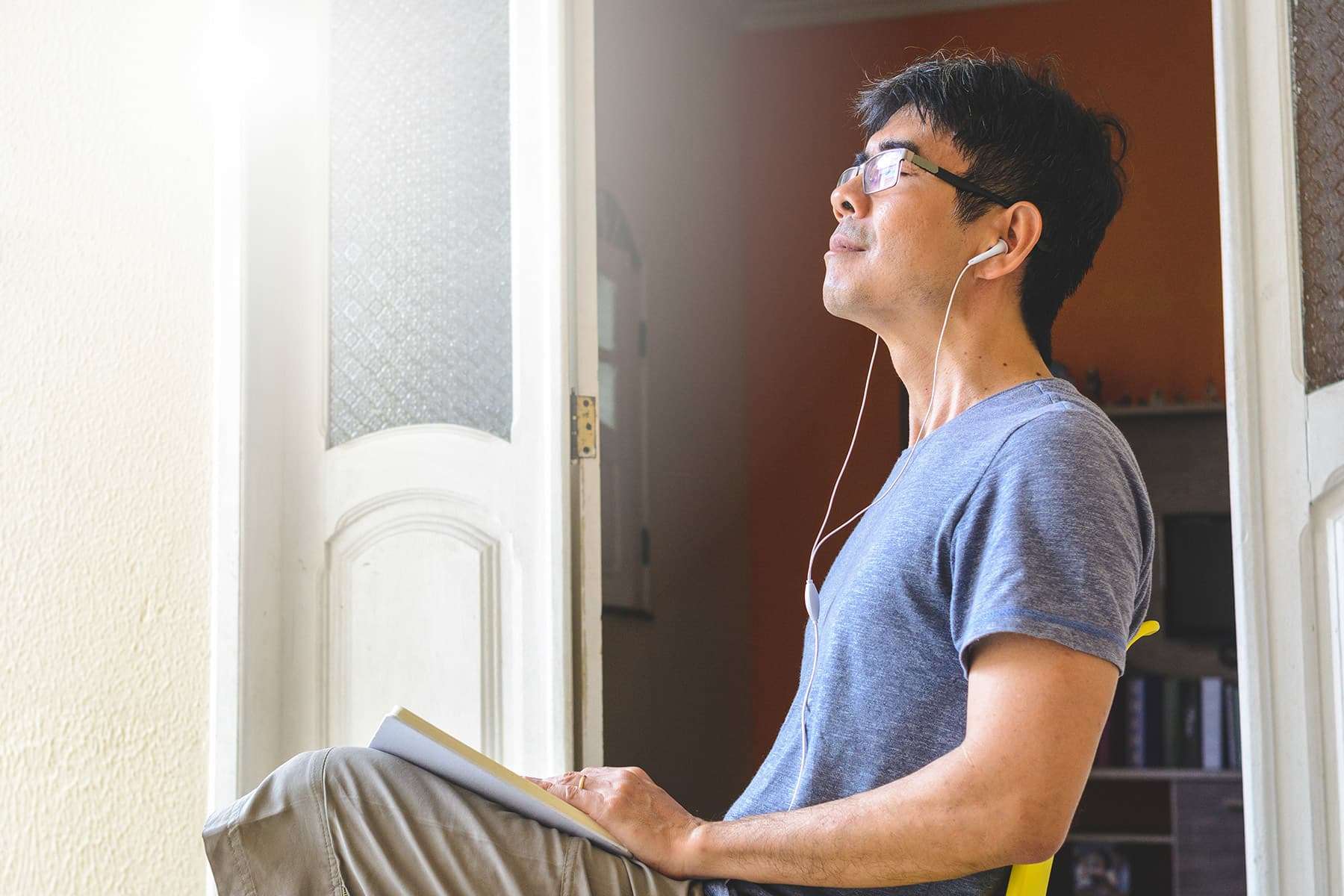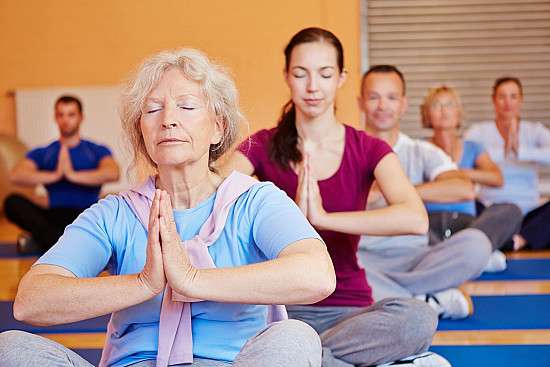Everyone feels anxious from time to time. Occasional anxiety is a normal reaction to uncertainty about what’s going to happen next, whether that’s in the next few minutes, days, or months.
Mental health experts define anxiety as worry over a threat that’s still in your future. Thinking about a conversation you dread, for example, could twist your stomach into knots days before it happens. Your heart may race before an exam or presentation. You might lie awake at night worried about whether you’ll catch COVID-19 at the grocery store.
It’s also normal to want to get rid of those uncomfortable, pit-of-the-stomach feelings as quickly as possible. But that approach can make you more anxious, says David H. Rosmarin, PhD, associate professor of psychology at Harvard Medical School in Boston.
“When you worry about getting rid of your anxiety, you’re signaling your nervous system that you have even more to be anxious about. And that makes your anxiety worse,” he says.
Keep in mind that if your anxiety is long-lasting and interferes with your daily life, you could have an anxiety disorder. In that case, you may need treatment to overcome it.

Share on Pinterest
I wasn’t always an anxious person, but after a depression diagnosis six years ago, I was quickly overwhelmed with symptoms that became hard to ignore.
As if depression wasn’t enough, my doctor diagnosed me with generalized anxiety disorder. Soon, it seeped into every aspect of my life, making it impossible to function normally.
I lived in fear of having to talk to strangers. I started to experience anxiety attacks, a racing heart, and feelings of nausea so intense that I avoided socializing in public places like bars and restaurants. For an entire year, I was unable to work at all.
When I decided to try working again, I took on a part-time role with zero responsibility and as little stress as possible to accommodate my anxiety disorder.
It took years of medication, therapy, and finding new healthy habits, but I can now say that I’m symptom-free almost every day.
Now I run my own freelance writing business. After being so afraid of public spaces, I now have the confidence to network with complete strangers, interview others live on the internet, and share my own personal video content on a daily basis.
I regularly speak on podcasts and Instagram Live broadcasts, and attend events in places I’ve never been before because I’ve finally got my anxiety under control.
Being held back for so long has made me even more determined to test my boundaries and reach my goals in spite of my anxiety.
It wasn’t easy, but by working with my doctor and learning some tricks, I’ve been able to manage my anxiety. I still have feelings of anxiety, and I doubt they’ll ever leave me permanently — I’ve just honed my skills and learned how to react more positively.
Here are my tips for taking action when anxiety strikes.
1. Avoid caffeine
Caffeine is well-known as an anxiety inducer. But for me, drinking coffee has become such a habit that I often forget how sensitive I am to it.
When I’m feeling anxious or I’m anticipating those feelings — like before I use public transportation — I always make a conscious decision to stop drinking caffeine. This goes for caffeinated soft drinks too.
2. Avoid alcohol
Feelings of anxiety can be so overwhelming that you might feel the urge to have a cocktail to help you relax.
Although this may work in the short term, alcohol actually changes the levels of serotonin and other neurotransmitters in the brain, making your symptoms worse. In fact, you may feel more anxious after the alcohol wears off.
3. Write it out
One of the worst aspects of anxiety is not knowing why you feel nervous in the first place. You could be lying on an idyllic beach with the ocean waves lapping in the distance and still feel worried for absolutely no reason.
That’s when writing can help. It can be an effective way to explore how you feel, especially if talking out loud feels impossible.
Studies show that keeping a journal is actually a healthy way to deal with negative feelings and can help reduce stress.
Another study found that anxious test participants who wrote a few notes before the test about how they were feeling and what they were thinking performed better than those who didn’t.
4. Use fragrance
Lavender is well known for its calming properties. Keep a small bottle of lavender oil on hand for the scent, for when you feel anxious thoughts brewing.
If you practice mindfulness or meditation, try smelling lavender during your practice. Over time, you’ll associate the feeling of relaxation with that scent, making it even more effective.
Shop for lavender oil.
5. Talk to someone who gets it
If your feelings of anxiety are making it hard to function, you should speak to a health professional. But talking to friends can also help. I have friends who have an anxiety disorder too. When I’m feeling really bad, I send them a message telling them how I’m feeling.
They might have a new hack I can try, or they can point out something that might have acted as a trigger. But sometimes it’s just nice to vent to someone who knows how it feels to be in my shoes.
6. Find a mantra
I use positive affirmations every day to help manage my mood. I also have a different mantra that I repeat to myself when I’m feeling anxious.
I’ll tell myself, “This feeling is only temporary.” This helps me feel calm, especially if I’m on the verge of a panic attack. I also remind myself that I’ve survived panic attacks in the past and acknowledge that it’s all going to be okay as long as I’m patient with myself.
7. Walk it off
Sometimes, when you’re experiencing anxiety, it’s because of a buildup of adrenaline. Exercise — even if it’s just a walk — can help use up that extra adrenaline.
I often feel anxious when I haven’t moved around enough during the day, so walking is an excellent way for me to use up excess energy.
Walking outside in the fresh air can also improve your well-being. One study found that people who took a walking trip in a wooded area had lowered production of stress hormones than when they remained in the city.
8. Drink water
You may not realize it, but not drinking enough water can make your anxiety symptoms worse. Dehydration can actually cause heart palpitations. This can lead to feelings of panic, which may trigger an anxiety attack.
Take a few moments to relax and drink a large glass of water and see if you feel any better.
9. Have some alone time
Having alone time is essential for me, and it helps me recharge my batteries and relax. If you’re feeling anxious, then find a reason to be alone. You could take a walk to the shop for some groceries, go to the gym, or clean the bathroom.
These are all clever little ways to find alone time without seeming rude. It’s also an opportunity to practice mindfulness, which can reduce symptoms of anxiety and panic.
10. Turn off your phone
Being constantly plugged in is a modern-day curse that we all need to learn to live with.
Don’t be afraid to turn off your phone once in a while. Use it as a chance to practice mindfulness, go for a bath, or write down why you’re feeling anxious.
11. Have a bath
Do you find that your anxious thoughts are taking a toll on you both physically and mentally? This is common, and it can be a vicious cycle, making it hard to relax if your body is tense.
A hot bath with Epsom salts is great for relaxing your muscles, which can also help relax your mind.
Shop for Epsom salts.
I find a bath is also good for encouraging meditation, because external distractions like TV are gone.
12. Eat something
I can get so wrapped up in my day at work that I forget to eat anything until two in the afternoon. It’s an easy mistake to make, and I often only remember to eat because I start to experience feelings of fear or worry.
Low blood sugar can make you feel nervous, irritable, and anxious. Try eating something easy to digest like a banana. Then follow it up with a well-balanced meal with protein, carbohydrates, and vegetables.
Controlling anxiety takes time
There’s no quick fix for anxiety, and it may often feel like an uphill struggle. But by gaining awareness of what causes your symptoms, and getting help from your doctor, you can manage your symptoms.
You may find some of these hacks work for you straight away and others may have no effect at all, but the important thing is to keep trying.
Giving in to feelings of anxiety by retreating from the world only served to make my life more difficult in the long run. Continuing to search for solutions that work for me has been key to my recovery. Practice makes perfect, so don’t stop trying to find ways that work for you.
Fiona Thomas is a lifestyle and mental health writer who lives with depression and anxiety. Visit her website or connect with her on Twitter.
Support is also available if you’re finding it hard to cope with anxiety, fear or panic.
Most people feel anxious or scared sometimes, but if it’s affecting your life there are things you can try that may help.
Symptoms of anxiety
Anxiety can cause many different symptoms. It might affect how you feel physically, mentally and how you behave.
It’s not always easy to recognise when anxiety is the reason you’re feeling or acting differently.
Physical symptoms
- faster, irregular or more noticeable heartbeat
- feeling lightheaded and dizzy
- headaches
- chest pains
- loss of appetite
- sweating
- breathlessness
- feeling hot
- shaking
Mental symptoms
- feeling tense or nervous
- being unable to relax
- worrying about the past or future
- feeling tearful
- not being able to sleep
- difficulty concentrating
- fear of the worst happening
- intrusive traumatic memories
- obsessive thoughts
Changes in behaviour
- not being able to enjoy your leisure time
- difficulty looking after yourself
- struggling to form or maintain relationships
- worried about trying new things
- avoiding places and situations that create anxiety
- compulsive behaviour, such as constantly checking things
Symptoms of a panic attack
If you experience sudden, intense anxiety and fear, it might be the symptoms of a panic attack. Other symptoms may include:
- a racing heartbeat
- feeling faint, dizzy or lightheaded
- feeling that you’re losing control
- sweating, trembling or shaking
- shortness of breath or breathing very quickly
- a tingling in your fingers or lips
- feeling sick (nausea)
A panic attack usually lasts 5 to 30 minutes. They can be very frightening, but they’re not dangerous and should not harm you.
Information:
If you’re not sure how you feel, try our mood self-assessment.



